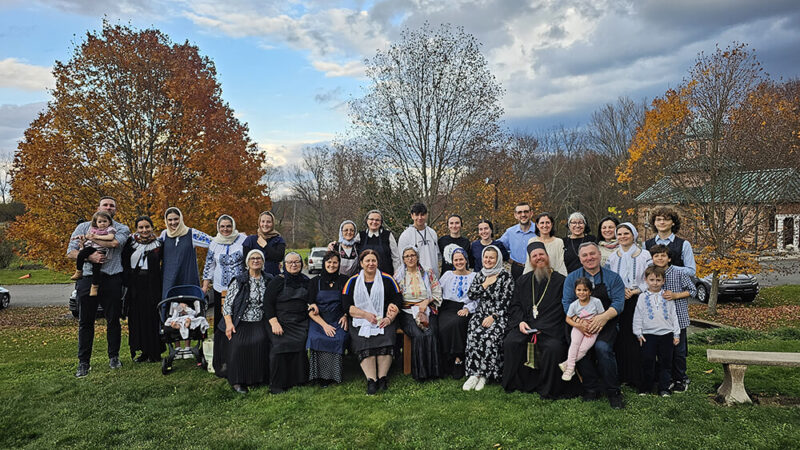
Apostolul din duminica a 24-a după Rusalii, a fost din Epistola către Efeseni a Sfântului Apostol Pavel, capitolul 2, versetele de la 14 până la 22. „De aceea, aduceți-vă aminte că, odinioară, voi, păgânii cu trupul, numiți netăiere-împrejur de către cei numiți tăiere-împrejur, făcută de mână în trup, erați, în vremea aceea, în afară de Hristos, înstrăinați de cetățenia lui Israel, lipsiți de nădejde și fără de Dumnezeu, în lume. Acum însă, fiind în Hristos Iisus, voi care altădată erați departe, v-ați apropiat prin sângele lui Hristos, Căci El este pacea noastră, El care a făcut din cele două – una” – aici se referă la poporul israelitean, cel ales, care a primit făgăduința, și restul lumii păgâne. Iar Mântuitorul a făcut din toate una în trupul Său, iar aceasta a făcut-o prin Sângele Său. „Desființând vrăjmășia în trupul Său, legea poruncilor și învățăturile ei, ca, întru Sine, pe cei doi să-i zidească într-un singur om nou și să întemeieze pacea, și să-i împace cu Dumnezeu pe amândoi, uniți într-un trup, prin cruce, omorând prin ea vrăjmășia. Și, venind, a binevestit pace, vouă celor de departe, și pace celor de aproape; că prin El avem și unii și alții apropierea către Tatăl, într-un Duh.”
Despre calitatea Mântuitorului de a împăca am dori să vorbim. În profețiile Vechiului Testament, se vorbește despre Mântuitorul, ca despre păstorul care vine să adune oile cele rătăcite (cf. Iezechiel 37, 24; Matei 15, 24). Chiar la Isaia, se vorbește despre cum umblau ca oile fără păstor, fiecare pe drumul său (cf. Isaia 53, 6), până când a venit El și i-a chemat la Sine (cf. Ioan 10, 27).
În general, vocația omului este să fie așa, împăciuitor. Sfântul Maxim Mărturisitorul spune că omul este un inel de legătură între Creator și creație, singurul, de altfel. Omul este făcut să împace toate, să lege și să unească toate. Mântuitorul ne-a arătat-o prin excelență. Sfântul Pavel vorbește despre unirea dintre evrei și păgâni, care se vede în Biserică.
Dar Mântuitorul a împăcat și pe Dumnezeu cu oamenii, în general. Părintele Zaharia Zaharou spune: „Hristos L-a îndreptățit pe Dumnezeu înaintea omului prin marea Sa dragoste. Dar Hristos l-a îndreptățit și pe om înaintea lui Dumnezeu, întrucât ne-a dat o pildă desăvârșită de ascultare. Așa L-a iubit pe Dumnezeu-Tatăl și tot neamul omenesc, încât nu Și-a cruțat propria viață și a făcut aceasta fără ca cineva să poată să-L vădească de păcat.” A fost Dumnezeu-Om și ne-a arătat cum poate să fie omul. A justificat crearea omului. A arătat cum este omul creat după chipul lui Dumnezeu. Așadar, lui Dumnezeu i-a arătat un Om, dar și oamenilor le-a arătat cum este Dumnezeu, „Părintele îndurărilor și Dumnezeul a toată mângâierea” (2 Corinteni 1, 3).
Și noi, la rândul nostru, suntem chemați să facem pace acolo unde ne aflăm, la nivelul nostru. În familie de exemplu. Marea greșeală este să credem că partea grea, partea cea mai importantă într-o relație este doar până la momentul căsătoriei, ca în love stories. De fapt, abia după căsătorie începe partea cea mai importantă, mai grea. Trăim cu impresia eronată că lucrurile frumoase și bune ar trebui să vină de la sine, când nu este deloc așa. Modelul mai apropiat este planta care crește. Ori nicio plantă nu crește de la sine, în afară de buruieni. Dacă vrei să ai o plantă folositoare, trebuie să ai grijă de ea. Așa este cu orice lucru bun și frumos pe pământ, mai ales în relațiile cu oamenii. Și noi toți suntem chemați la această lucrare de împăcare. A noastră cu Dumnezeu, a noastră cu ceilalți oameni. De obicei, mamele se pricep cel mai bine la asta. Ele joacă rolul acesta de intermediar, de împăciuitor.
Sfântul Pavel ne spune cum a făcut Mântuitorul împăcarea, „voi care altădată erați departe, v-ați apropiat prin sângele lui Hristos”; „și să-i împace cu Dumnezeu pe amândoi, uniți într-un trup, prin cruce, omorând prin ea vrăjmășia.” Deci, orice împăcare se va face doar prin jertfă. Să fim pregătiți pentru asta. Sânge și cruce. Nu ne va fi ușor, pentru că lucrează și cel rău. Dar aceasta este chemarea noastră și e bine să ne maturizăm, să nu mai fim copii, care așteaptă doar lapte și miere. Ci, să fim adulți, următori ai lui Hristos, care înseamnă să Îl urmăm în faptă. El ne îndemnă și pe noi, ca, de dragul Său, să mai renunțăm la dreptatea noastră, ca să facem pace, să fim următorii Săi. Pentru că de aceea, zice: „Fericiți făcătorii de pace, că aceia fiii lui Dumnezeu se vor chema” (Matei 5, 9). Așa devenim și noi ca El. Dar nu vine de la sine. Curge mult sânge, multe lacrimi și multă sudoare ca să împlinim această împăcare.
